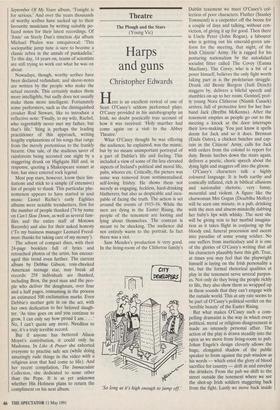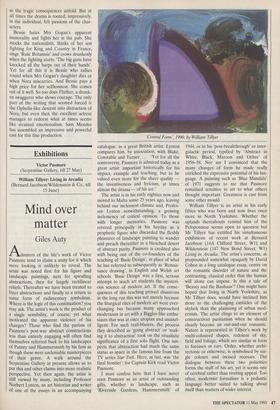Theatre
The Plough and the Stars (Young Vic)
Harps and guns
Christopher Edwards
Here is an excellent revival of one of Sean O'Casey's seldom performed plays. O'Casey provided in his autobiography an Irish, no doubt poetically true account of how it was received: 'Holy murther had come again on a visit to the Abbey Theatre.'
What O'Casey thought he was offering the audience, he explained, was the mimic, but by no means unimportant portrayal of a part of Dublin's life and feeling. This included a view of some of the less elevated aspects of Ireland's political and moral life, pubs, whores etc. Critically, the picture was some way removed from sentimentalised, self-loving Irishry. He shows them not merely as engaging, feckless, hard-drinking blatherers, but also as despicable and inca- pable of facing the truth. The action is set around the events of 1915-16. While the men are dying in the Easter Rising, the people of the tenement are looting and lying about themselves. The contrast is meant to be shocking. The audience did not entirely warm to the portrait. In fact there was a riot.
Sam Mendes's production is very good. In the living-room of the Clitheroe family's `So long as it's high enough to jump off.'
Dublin tenement we meet O'Casey's col- lection of poor characters. Fluther (Stanley Townsend) is a carpenter off the booze for a couple of days and talking, without con- viction, of giving it up for good. Then there is Uncle Peter (John Rogan), a labourer who is getting out his emerald-green uni- form for the meeting, that night, of the Irish Citizens' Army. He is ragged for his posturing nationalism by the autodidact socialist fitter called The Covey (Eanna Macliam). The Covey, who is a bit of a poser himself, believes the only fight worth taking part in is the proletarian struggle. Drunk old Bessie Burgess (Judi Dench) staggers by, delivers a bileful speech and stumbles on up to her room. Genteel, pret- ty young Nora Clitheroe (Niamh Cusack) arrives, full of protective love for her hus- band Jack (Breffni McKenna). After the tenement empties as people go out to the meeting a knock at the door interrupts their love-making. You just know it spells doom for Jack and so it does. Brennan (Enda Oates), a chicken butcher and cap- tain in the Citizens' Army, calls for Jack with orders from the colonel to report for duty. Bessie lurches down the stairs again, delivers a poetic, choric speech about the dying light and staggers off into the gloom.
O'Casey's characters talk a highly coloured language. It is both earthy and comically inflated, rich in biblical allusions and nationalist rhetoric, very funny, mournful and violent. A figure like the charwoman Mrs Gogan (Dearblha Molloy) will be seen one minute, in a pub, drinking with the men and absent-mindedly dabbing her baby's lips with whisky. The next she will be giving rein to her morbid imagina- tion as it takes flight in conjuring up the bloody end, funeral procession and ascent into paradise of some young soldier. No one suffers from inarticulacy and it is one of the glories of O'Casey's writing that all his characters plausibly have this gift. True, at times you may feel that the playwright himself is laying on the Irish personality a bit, but the formal rhetorical qualities at play in the tenement serve several purpos- es. Not only do they bring the people richly to life, they also show them so wrapped up in these sounds that they can't engage with the outside world. This at any rate seems to be part of O'Casey's political verdict on the `terrible beauty' of the Easter Rising.
But what makes O'Casey such a com- pelling dramatist is the way in which every political, moral or religious disagreement is made an intensely personal affair. The action of the play is drawn steadily into the open as we move from living-room to pub. Johan Engels's design cleverly allows the huge, elongated shadow of the public speaker to loom against the pub window as his words — which extol the glory of blood sacrifice for country — drift in and envelop the drinkers. From the pub we shift to the street outside the tenement where we see the shot-up Irish soldiers staggering back from the fight. Lastly we move back inside as the tragic consequences unfold. But at all times the drama is rooted, impressively, in the individual, felt passions of the char- acters.
Bessie hates Mrs Gogan's apparent immorality and fights her in the pub. She mocks the nationalists, thinks of her son fighting for King and Country in France, sings 'Rule Britannia' and crows drunkenly when the fighting starts: The big guns have knocked all the harps out of their hands'. Yet for all this it is Bessie who rallies round when Mrs Gogan's daughter dies or when Nora miscarries. And Bessie pays a high price for her selflessness. She comes out of it well. So too does Fluther, a drunk- en swaggerer who shows courage. The only part of the writing that seemed forced is the Ophelia-like descent into distraction of Nora, but even then the excellent actress manages to redeem what at times seems like strained emotionalism. Sam Mendes has assembled an impressive and powerful cast for this fine production.



























































 Previous page
Previous page